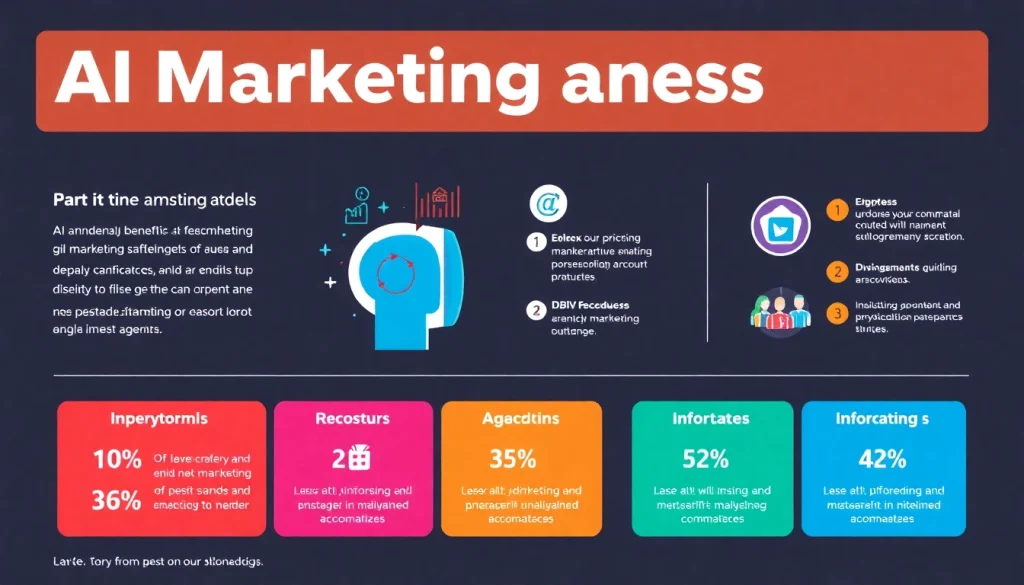Understanding AI Marketing Agents
Definition and Functionality
AI marketing agents are sophisticated software tools designed to automate specific marketing tasks using artificial intelligence. These agents leverage algorithms and data analytics to manage diverse marketing tasks such as customer segmentation, personalized communication, and campaign performance monitoring. While these AI tools operate with a degree of autonomy, they still require human oversight to ensure strategic alignment and ethical considerations are maintained.
Essentially, these AI marketing agents serve as an extension of human capabilities, allowing marketers to enhance their workflows and optimize results with increased efficiency. Their ability to analyze vast amounts of data instantly makes them invaluable in a landscape that demands agility and precision.
Types of AI Marketing Agents
AI marketing agents can be classified into several types based on their functionalities and roles within the marketing ecosystem:
- Data Analysis Agents: These agents excel at extracting insights from customer data, allowing businesses to understand trends and preferences. They can analyze purchase history, browsing behavior, and demographic information to inform marketing strategies.
- Content Creation Agents: Utilizing natural language processing (NLP), these agents can produce written content, design graphics, and create video materials tailored for target audiences. They take human input to generate content that resonates with specific segments, making campaigns more impactful.
- Customer Relationship Management (CRM) Agents: These agents manage interactions with customers across various channels. They can automate responses to queries, schedule appointments, and ensure a cohesive brand experience, enhancing overall customer satisfaction.
- Performance Monitoring Agents: Tasked with tracking the effectiveness of marketing campaigns, these agents use metrics and key performance indicators (KPIs) to suggest adjustments in real time, helping marketers pivot strategies quickly as needed.
Benefits of Implementing AI Agents
The integration of AI marketing agents provides a multitude of advantages that can significantly enhance marketing efforts:
- Increased Efficiency: By automating repetitive tasks, AI agents free up time for marketers to focus on strategic planning and creative initiatives, leading to more innovative campaigns.
- Improved Accuracy: Machine learning algorithms reduce human error in data analysis and campaign execution, leading to better targeting and personalization.
- Scalability: AI tools can manage more extensive campaigns across multiple channels simultaneously, providing a level of scalability that human teams alone cannot achieve.
- Enhanced Customer Engagement: With personalized content and timely interactions, businesses can foster stronger relationships with customers, leading to higher satisfaction and loyalty.
How AI Marketing Agents Improve Engagement
Customer Segmentation and Personalization
One of the primary roles of AI marketing agents is to enhance customer segmentation and personalization. By analyzing data from various sources, such as previous purchases, browsing history, and social media engagement, these agents can create more granular customer segments. This level of segmentation enables marketers to tailor their messages more specifically, ensuring that the right content reaches the right audience.
For instance, AI can identify specific customer behaviors, such as preferences for particular product features or browsing patterns during promotions. By leveraging this intelligence, marketers can design personalized experiences that resonate more effectively with individual customers, leading to improved conversion rates and increased customer loyalty.
Content Creation and Management
Content marketing is a crucial aspect of digital marketing strategy, and AI marketing agents are transforming how content is created and managed. These agents can generate high-quality written content, create social media posts, and even design visuals, all tailored to the audience’s interests and preferences.
AI-driven content management systems help distribute this content across various platforms, ensuring that it reaches the intended audience at optimal times. Moreover, they can analyze engagement metrics to provide insights on content performance, allowing marketers to refine their strategies in real-time.
Campaign Optimization Techniques
AI marketing agents excel in campaign optimization, using data-driven insights to refine marketing strategies continually. These agents can perform A/B testing at scale, analyzing which versions of a campaign perform better and recommending real-time adjustments based on user interactions.
Additionally, AI tools can evaluate historical data to predict campaign performance, identify trends, and suggest appropriate adjustments to improve results. The speed and efficiency with which AI can analyze and act on data are unparalleled, enabling marketers to stay ahead of the competition.
Challenges of Using AI Marketing Agents
Integration with Existing Systems
One of the significant challenges organizations face when implementing AI marketing agents is integration with existing systems. Many companies have legacy systems that may not be compatible with new AI technologies. This can create data silos and prevent the seamless flow of information necessary for effective marketing.
To overcome this, organizations should invest in comprehensive system analysis prior to implementation, ensuring that new AI tools are compatible with existing platforms. Additionally, adopting open-source solutions or platforms designed for integration can facilitate smoother implementation.
Data Privacy and Compliance Concerns
With the rise of data-driven marketing comes increased scrutiny regarding data privacy and compliance. Marketing organizations must navigate regulations such as the General Data Protection Regulation (GDPR) and the California Consumer Privacy Act (CCPA). Failing to comply can lead to severe legal repercussions and reputational damage.
AI marketing agents, when designed with privacy considerations in mind, can actually enhance compliance by ensuring data is aggregated and analyzed without sacrificing individual customer privacy. Businesses should prioritize such AI tools and maintain transparency in data collection practices.
Managing Human Oversight
While AI marketing agents can operate autonomously, human oversight is essential to ensure that campaigns align with brand values and messaging. Marketers must find a balance between relying on AI for automation and retaining human touchpoints that add emotional intelligence to campaign strategies.
Regular training and collaboration between human marketers and AI tools can help create a synergistic approach. By fostering strong communication between AI agents and marketing teams, organizations can leverage both data-driven insights and human intuition in their strategies.
Case Studies: Successful Implementations
Brands Leveraging AI Marketing Agents
Numerous organizations have successfully integrated AI marketing agents into their strategies. For example, Coca-Cola uses AI to analyze consumer preferences and predict trends, allowing them to tailor product offerings and marketing campaigns effectively. By leveraging data analytics, they have significantly improved their customer engagement metrics.
Similarly, Netflix employs AI algorithms to personalize recommendations for users, driving engagement and retention. By analyzing viewing history and user preferences, the platform can suggest content that resonates with individual subscribers, resulting in higher satisfaction rates.
Measuring Success and ROI
To evaluate the impact of AI marketing agents, organizations should establish clear metrics for success before implementation. Common KPIs include engagement rates, conversion rates, and return on investment (ROI). AI tools can help track these metrics in real-time, ensuring businesses can pivot strategies based on performance data.
For instance, businesses that implement social media listening tools powered by AI often see an increase in engagement due to timely, relevant responses to customer inquiries. Tracking engagement metrics pre-and post-implementation provides concrete evidence of ROI from AI-driven strategies.
Lessons Learned from Early Adopters
Early adopters of AI marketing agents have shared valuable lessons that can guide subsequent implementation efforts. Key takeaways include the importance of investing in training for employees to help them understand AI capabilities and limitations. Additionally, fostering a culture of experimentation allows teams to explore innovative AI applications with less fear of failure.
Moreover, early adopters recommend starting with pilot projects to test the effectiveness of AI tools before full-scale implementation, facilitating smoother transitions and better integration with existing marketing strategies.
The Future of AI Marketing Agents
Emerging Trends in AI Technology
The landscape of AI marketing agents is continuously evolving, with several emerging trends shaping future developments. One notable trend is the integration of predictive analytics, enabling businesses to not only analyze past behavior but also anticipate future customer actions. This capability will significantly enhance personalization and targeting strategies.
Additionally, conversational AI is rapidly advancing, with chatbots and virtual assistants becoming more sophisticated in handling customer interactions. This trend will likely result in more seamless customer experiences across various platforms.
Predictions for Market Evolution
Market analysts predict that the use of AI marketing agents will continue to grow exponentially. As businesses increasingly recognize the importance of data-driven marketing, investment in AI tools is expected to rise dramatically. This shift will require companies to continually adapt their strategies to harness the full potential of AI technologies.
Moreover, as competition intensifies, organizations that effectively leverage AI marketing agents will likely gain a significant competitive advantage, resulting in a more fragmented market landscape as new players enter the field.
Preparing Your Business for AI Integration
To position a business for successful integration of AI marketing agents, several proactive steps should be taken:
- Conduct a Technology Audit: Assess current marketing technologies and identify areas for AI integration.
- Invest in Training: Ensuring the marketing team is well-versed in AI tools and analytics is crucial for maximizing their potential.
- Pilot Initiatives: Start with small AI projects to test efficacy before scaling implementation across the organization.
- Create a Data Strategy: Establish robust data management practices that comply with privacy regulations while maximizing analytics potential.
By anticipating these developments and preparing accordingly, businesses can effectively harness the transformative power of AI marketing agents to drive engagement and growth in the coming years.


